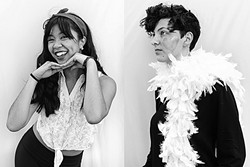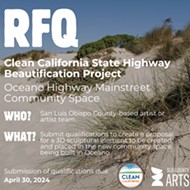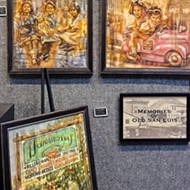[{
"name": "Ad - Medium Rectangle CC01 - 300x250",
"id": "AdMediumRectangleCC01300x250",
"class": "inlineCenter",
"insertPoint": "8",
"component": "2963441",
"requiredCountToDisplay": "12"
},{
"name": "Ad - Medium Rectangle LC01 - 300x250",
"id": "AdMediumRectangleCC01300x250",
"class": "inlineCenter",
"insertPoint": "18",
"component": "2963441",
"requiredCountToDisplay": "22"
},{
"name": "Ad - Medium Rectangle LC09 - 300x250",
"id": "AdMediumRectangleLC09300x250",
"class": "inlineCenter",
"insertPoint": "28",
"component": "3252660",
"requiredCountToDisplay": "32"
}]
Cal Poly’s Chumash Auditorium is packed to the brim with one of the most diverse crowds you’ll see at an event in San Luis Obispo—people of all ages, colors, and walks of life take their seats for the sold-out April 28 showing of OWN—Original Women’s Narratives.
OWN is the Cal Poly Gender Equity Center’s take on the Vagina Monologues, aiming to create a more inclusive production to showcase the stories and experiences of students who identify as women. The show comprises a series of dramatic readings—complete with costumes and lighting and, in some cases, choreography—of letters and poems submitted by Cal Poly students. Readings touch on topics ranging from body image to college struggles, and some tackle issues as dense as suicidal thoughts and rape. The production first took to the stage in 2016, and it returned this year with resounding success, despite some planning hiccups and minor technical difficulties.
By the show’s 7 p.m. start, its promised appetizers and refreshments have run dry. Producer Kirsten Vinther takes the stage to welcome the packed audience, and cast member Tunmi Da Silva follows to introduce her fellow cast members: a total of 16 self-identifying women strutts single-file up the center aisle toward the stage, each dressed to express, until reaching their spots onstage and striking poses.
Then the show kicks off for real. The opening act focuses on women of color, starting with a reading of “Dear Black Women,” submitted by Tyler Payton and performed by Sena Agbemadon. Agbemadon’s performance calls on her black sisters to remember their worth and beauty, and on the rest of the world to recognize its biases and work harder to respect black women. In the next reading, “I Am,” Evelyn Teodoro gives a half-Spanish, half-English performance telling the story of a Latina woman’s roots. The piece “Realizations of a Dark Skinned Woman” uses choreography between Da Silva and fellow performer Aliyah Purnell to tell a story of objectification, stereotyping, and overcoming limitations.
That first set of readings reveals some sound-related issues: Microphones go in and out and are often too quiet, making it almost impossible to listen attentively from the back of the room (especially if the person next to you is eating the world’s loudest snack and incessantly crinkling its wrapper—just saying). But even with volume difficulties, the messages come through loud and clear, and they are powerful.
The next section explores the subject of women’s bodies, opening with a reading by Alison O’Neill of her own piece, “The Ghost of a Body.” O’Neill kicks it off by addressing the audience, saying she felt almost undeserving to stand before them as a woman, before launching into a rich description of gender fluidity and the painful space between femininity and masculinity. The rest of this section alternates nicely between heavy and light: “Girls Don’t Poop” gives the crowd a good laugh, as did “I got 99 Problems, But My Body Ain’t One” (ever heard the term “meat curtain” to describe the labia?). This section provides a nice breather before transitioning into the heavier topic of mental health, which comes next in the performance and addresses suicidal feelings, depression, and anxiety.
Four performances then delve into the subject of family, in which the standout readings focus on the claustrophobic nature of living in poverty (“Master Bedroom,” performed by Yvette Solano) and the continued realization of what it means to be a woman, the final step being watching a wife care for her terminally ill husband (“This is Womanhood,” performed by Sabrina Oro). Cast members then give a trigger warning before the production’s next section, which recounts experiences of sexual assault.
Zahnae Aquino, Rachita Upadhya, and Arden Castle takes the stage in a triangle formation, with the spotlight on Aquino in front. She launches into a reading of “One Hundred Thoughts,” submitted by Maggie Thompson, and then rotates to the back as Upadhya takes the spotlight to read the anonymously submitted “Gray.” Castle reads last, performing “These Words (No Room for Love),” by Jasmine Mae Viera. It is a heavy set of readings, to say the least—each performer leaves the spotlight in tears, bringing several audience members to sobs, as well.
Then comes a lighter, but still intense, take on sexuality, where Austine De Los Santos, Morgan Gutierrez, and Castle explores the subject of being a female student at Cal Poly who loves women. De Los Santos and Gutierrez perform “Not Your Experiment” side-by-side to describe the confusion of identifying as gay or bisexual in college, when same-sex relationships are stereotypically viewed as experimental. Castle then leaves the section on a high note with “The Things I Love About Women”—it is exactly what the title implies, and it is beautiful.
OWN winds down with accounts of womanhood in college. Aquino gives a strong and hilarious performance of “Isaac Newton Would Have Called Me Stupid,” donning a wig and owning the stage with a dramatic telling of the similarities between the narrator and Isaac Newton. The following cast reads about the woes of being an “underdog” college student and the harsh realities of going out, ending with a short-but-sweet reading of “I Am Woman, Yes I Am” by Purnell.
The evening wraps up at about 10:15 p.m., so it’s been a long one, and it went without snacks or drinks (including water, which ran out by intermission). But overall, OWN triumphed; it was well worth the time.
Sun Staff Writer Brenna Swanston is a Cal Poly alumna. Contact her at [email protected].











